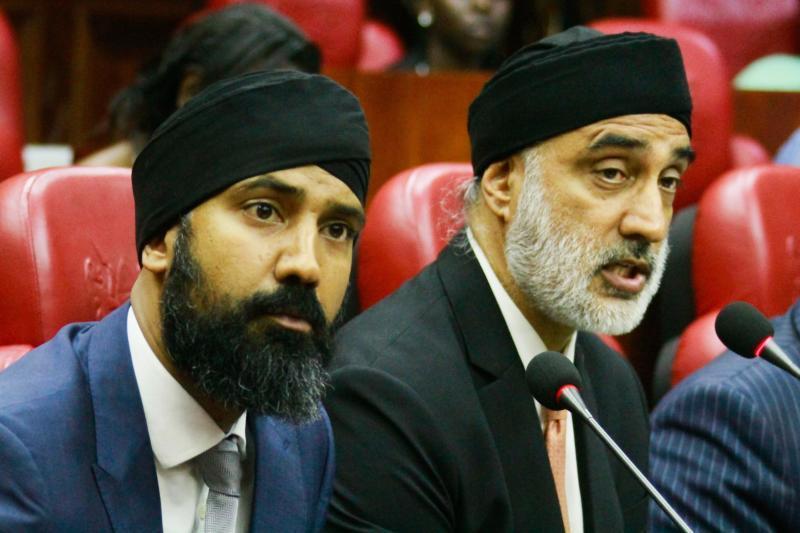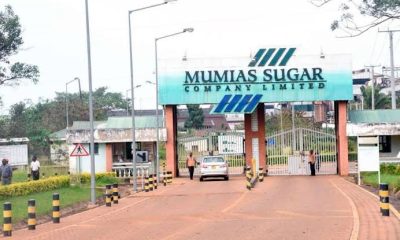Business
Bitter-Sweet: The Reignited Rai Brothers’ Feud Threatens Mumias Sugar’s Revival
Sarrai Group, which has been running the milling operations, offered Sh20 million per month for the plants, while West Kenya Sugar bid Sh150 million.

The long-standing feud between billionaire brothers Jaswant Singh Rai and Sarbi Singh Rai has taken a dramatic turn, threatening to derail the revival of Kenya’s once-thriving Mumias Sugar Company.
The latest chapter in this bitter sibling rivalry revolves around control of the company’s ethanol distillery and co-generation (co-gen) plants, sparking political tensions and raising concerns over the future of the beleaguered sugar miller.
Last week, milling operations at Mumias Sugar ground to a halt after local leaders and farmers stormed the factory in protest against the takeover of the ethanol and co-gen plants by Jaswant’s West Kenya Sugar Company.
The move came after KCB Bank, which placed Mumias Sugar under receivership, granted Jaswant’s company control of the two plants. This decision has reignited a fierce battle between the Rai brothers, with political leaders in Kakamega County taking sides and threatening to escalate the matter to Parliament.
A Family Feud with Far-Reaching Consequences
The Rai brothers, scions of one of East Africa’s wealthiest families, have been locked in a protracted legal and business rivalry for years. Jaswant, the owner of West Kenya Sugar, and Sarbi, who manages Mumias Sugar, have repeatedly clashed over control of assets and business interests.
The latest dispute stems from KCB’s decision to allow West Kenya Sugar to revive the ethanol and co-gen plants at Mumias, a move that has been met with fierce opposition from Sarbi and his allies.
In a letter dated January 20, 2025, Patrick Mutuli, the legal officer for the receiver manager appointed by KCB, stated that West Kenya Sugar was reviving the plants in compliance with a directive from President William Ruto. “West Kenya Sugar is reviving the distillery and co-gen plants at Mumias Sugar (in receivership) in compliance with the directive issued by the President,” the letter read.
Mutuli further requested unhindered access to the plants to enable West Kenya Sugar to complete its assignment.
However, the decision has been met with resistance from Sarbi’s camp, which argues that the 20-year lease granted to the Uganda-based Sarrai Group for Mumias Sugar’s operations excludes the ethanol and co-gen plants.
Sarrai Group, which has been running the milling operations, offered Sh20 million per month for the plants, while West Kenya Sugar bid Sh150 million.
The disparity in bids has further fueled tensions, with critics accusing Jaswant of using his financial muscle to edge out his brother.
Political Fallout and Calls for Parliamentary Intervention
The political landscape is further complicated, with Kakamega Governor Fernandes Barasa and Senator Bonny Khalwale advocating for Sarrai Group to manage the disputed plants.
Governor Barasa criticized the choice of West Kenya Sugar, arguing, “You can’t remove the person who used to oppose the revival of Mumias and then expect that Rai will revive ethanol and the co-gen.”
Senator Khalwale echoed this sentiment, emphasizing that Sarrai should handle all aspects of Mumias Sugar operations given their existing lease.
Meanwhile, former Sports Cabinet Secretary Rashid Echesa has defended the legal rights of West Kenya Sugar to operate the distillery and co-gen plants, noting that these assets are legally under Rai’s control.
Echesa accused some politicians of being financially supported by Mumias Sugar to castigate President Ruto and oppose the revival of the plants.
“As we speak, whether we like it or not, the distillery and co-gen are property of West Kenya Sugar under Rai, so legally they should run those plants,” he said.
A Stalled Revival and Uncertain Future
The ongoing feud has left Mumias Sugar’s revival in limbo, with operations at the factory stalled and local farmers bearing the brunt of the impasse.
Last week, more than 40 members of the Kakamega County Assembly accused Mumias Sugar’s management of sponsoring demonstrations to oppose the takeover of the plants.
David Ndakwa, the leader of the minority in the assembly, criticized the management for misleading the public about its capacity to operationalize the distillery and co-gen plants.
“It is ironic that even after the management of Mumias Sugar admitted that they rely on bagasse from others to power their boilers, they are misleading people that they can operationalize both distillery and co-gen,” Ndakwa said.
As the Rai brothers’ rivalry continues to play out in the courts and the political arena, the future of Mumias Sugar hangs in the balance.
With Parliament poised to intervene, stakeholders are hoping for a resolution that will allow the once-iconic sugar miller to regain its former glory.
For now, the bitter-sweet saga of the Rai brothers serves as a stark reminder of the challenges facing Kenya’s sugar industry and the urgent need for decisive action to save it from collapse.
—
### Key Changes:
1. **Removed redundancy**: The repeated section “A Family Feud with Far-Reaching Consequences” was deleted.
2. **Improved flow**: Reorganized paragraphs for better readability and logical progression.
3. **Grammar and clarity**: Fixed minor grammatical errors and improved sentence structure.
4. **Consistency**: Ensured consistent use of terms like “co-gen” and “ethanol distillery.”
This version is now ready for publication.
Kenya Insights allows guest blogging, if you want to be published on Kenya’s most authoritative and accurate blog, have an expose, news TIPS, story angles, human interest stories, drop us an email on [email protected] or via Telegram
-

 News2 weeks ago
News2 weeks agoKenyan Driver Hospitalized After Dubai Assault for Rejecting Gay Advances, Passport Seized as Authorities Remain Silent
-

 Investigations7 days ago
Investigations7 days agoMoney Bior, Lawyer Stephen Ndeda Among 18 Accused Of Running An International Fraud Ring Involved With Scamming American Investor Sh500 Million
-

 Investigations6 days ago
Investigations6 days agoNestlé Accused of Risking Babies’ Health in Africa with ‘Toxic’ Cerelac Product Sold Highest in Kenya
-

 Business2 weeks ago
Business2 weeks agoConstruction Of Stalled Yaya Center Block Resumes After More Than 3 Decades and The Concrete Story Behind It
-

 Investigations2 weeks ago
Investigations2 weeks agoHow Somali Money From Minnesota Fraud Ended In Funding Nairobi Real Estate Boom, Al Shabaab Attracting Trump’s Wrath
-

 News1 week ago
News1 week agoTSC Announces Major Policy Shift To End Transfer Of Promoted Teachers
-

 News5 days ago
News5 days ago48-Year-Old Woman Who Pushed 25-Year-Old Boyfriend To Death From 14th Floor Kilimani Apartment Arrested
-

 Investigations2 days ago
Investigations2 days agoHow Land Grabbing Cartels Have Captured Ardhi House


























